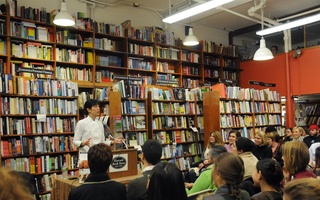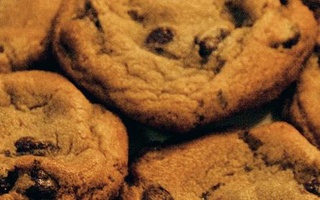“There's this idea that dessert should be pretty,” Dana Ferrante ’17 says. "Something about dessert makes people want to eat it, even if they're not hungry.” Speaking as one of several passionate bakers on Harvard’s campus, Ferrante’s remark epitomizes an approach to dessert-making that is common among serious practitioners.
For culinary disciples of the sweet persuasion, whose areas of expertise range from cake decoration to bread making and from dessert blogging to culinary competitions, the art of dessert is far more than a simple pastime. It is a standalone craft with its own culture of techniques, experts, and aesthetic trends—one that can serve as both an anchor of community and a creative outlet for the Harvard students who practice it.
PRETTY ENOUGH TO EAT
One hour, two burners, two three-course meals, no appliances. Those are the limits set by the National ProStart Invitational, a culinary arts and restaurant management competition for teams of high school students. “I was sort of the designated dessert expert on our team,” says Ferrante, whose 2012 dessert earned seventh place in the nation and included a mug and saucer formed out of melted chocolate. A dessert made by Ferrante the following year consisted of maple-flavored whipped Bavarian cream—a dish with a mere 20-second window separating uncooked from overdone.
{shortcode-1bab1e4957e3fbc6432851f5496f985881d6a323}
Ferrante’s team spent hours debating the look and shape of the mug and the plating of the dishes before the competition. “We had so many debates about the aesthetics of the cup—how big should the handle be, what shape should it be?” Ferrante says. “Even the cinnamon topping—do you need it? Probably not, but it makes it look so much nicer.”
When we meet at Lamont Café, Ferrante flips through the plan for a sustainable restaurant business model that her team put together for the restaurant management competition in 2013. She points to an apple, pear, and cheese dessert made with local cranberries and maple syrup. “This final product I think worked so well because it was symmetrical, and the glaze and cranberries go through the entire dish, which gives it a sense of unity," she says. "In the end, you can make something that tastes amazing, but if it doesn't look appealing you're going to need to persuade people to try it."
The aesthetic side of dessert-making is also important to Alec D. Yeh ’14. While still in high school, Yeh would sometimes arrive at Rancatore's Ice Cream where he worked in Belmont, Mass. at 3 a.m. to begin decorating ice cream cakes. "I really liked that solitary time," he says. "I would listen to music and be creative." As the unofficial "cake guy" at Rancatore's, which was founded by Joe Rancatore, the brother of the owner of the famed Toscanini's Ice Cream in Cambridge, Yeh clocked in hours of decorating that doubled as artistic education. On the job, Yeh learned about frosting, piping, and design. "My early cakes were abstract and color-based,” he says. “The owner really liked them and told me I could invest in more tools to make the cakes more intricate.”
{shortcode-860504c535291a6ec331ce4bb07faf8aa52a017c}
Cake decorating became an important part of Yeh's senior year of high school, something he discussed in his college interview for Harvard. When we need, he pulls out his phone and starts flipping through some pictures. "This is the cake I asked my prom date to prom with," he says, pointing out one photo. "This is the first time I worked with waffle cones…. This is a cake that was featured in the Boston Globe." Intricate piped frosting designs and angular waffle cones grace Yeh's creations, some of which look more like modern art than dessert.
The sensory appeal of dessert is also a central focus for Eliza Pan ’15, whose past creations on campus have included cakes incorporating piped frosting and stenciled powdered sugar, as well as a chocolate Kahlua cake made in a rice cooker in Pan’s tiny Currier kitchen. “The aesthetic side of the dessert is very important, and something I invest a lot of effort into—which is why some people think I’m an ‘amazing’ baker even if it only tastes ‘good!’” Pan says, laughing.
{shortcode-e14004129de30a51c040fda8d9904fc62991f343}
Read more in Arts
"Salomé" Loses Its HeadRecommended Articles
-
 Joanne Chang, Owner of Flour Bakery, Shares Culinary Expertise
Joanne Chang, Owner of Flour Bakery, Shares Culinary Expertise -
 Cookies for a Cause
Cookies for a Cause -
Alleged Rapes Prompt ConcernLast month’s two sexual assaults, the first reported cases of stranger rape on the Harvard campus in 12 years, loomed over this academic year’s move-in.
-
UC Approves Budget, Elects New SecretaryFew changes were made to this year’s budget, but the Council did debate how to allocate additional funds it will receive in revenue.













